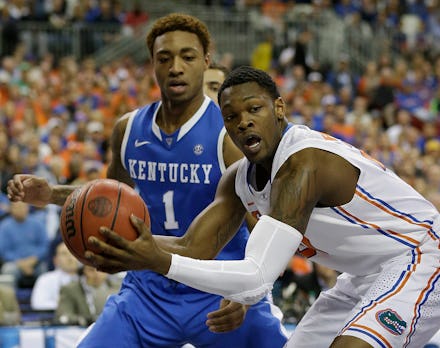Here's How Many Billions College Players Will Make During March Madness This Year

Zero dollars. That's how much money NCAA men's basketball players will earn in the next few weeks. And with the March Madness tournament underway, so too begins the storied tradition of loudly complaining about this exploitative and unfair whole system.
The fallacy of the "student-athlete" moniker grows more egregious each year, as NCAA revenue from the tourney reaches astronomical heights. In 2012, TV ad earnings alone eclipsed $1 billion. That same year, the NFL playoffs generated $976 million, while the NBA, MLB and NHL playoffs combined failed to out-earn March Madness, clocking a paltry $991 million.
Image Credit: Marketplace Freakonomics Radio
Michael Lewis, author of The Blind Side and Moneyball, perhaps said it best: "It's a purely commercial enterprise, and a pretty ruthless one." He adds: "College sports is professional in every aspect but one. They don't pay the players."
But ad revenue is just a small part of the story. Investopedia identifies four more extremely lucrative ways the tournament makes money, none of which goes to the players:
1) Broadcast rights: In April 2010, the NCAA inked a deal with CBS that made the network its exclusive March Madness outlet. The contract lasts for 14 years and is worth a whopping $10.8 billion. This contract alone is projected to generate $771 million per year for the NCAA.
2) "The basketball fund": The NCAA's annual March Madness revenue is divided among the different basketball-playing schools and conferences (i.e. the Pac-12, SEC, etc.) based on factors such as schools' numbers of sports teams, scholarships awarded and tournament performances. Conferences also have a hand in divvying up these large money pots (between 2005 and 2011, the top-earning Big East conference made $86.7 million) either evenly amongst schools or based on March Madness performance and revenue generated. According to Forbes, a team's trip to the Final Four earns its conference $9.5 million.
3) Ticket sales and sponsorships: During March Madness, tickets and sponsors generate about $40 million in revenue. Combined with the money from the broadcast rights, this accounts for 96% of the NCAA's total annual revenue.
4) Wagers: What happens in Vegas stays in Vegas, especially if it involves an unlucky March Madness bet. Americans wager an estimated $7 billion a year on the tournament. That's $1 billion more than the Super Bowl.
This is all to say one thing: The March Madness tournament is worth a shitload of money. But while the NCAA makes it rain in the club, its players aren't exactly partaking in the festivities.
Image Credit: College Candy
Despite what seems an obvious employer-laborer relationship — in an organization that's a pro sports league in almost every way but its name — the NCAA avoids paying its players by designating them "student-athletes." As Gary Gutting points out in a New York Times op-ed, this name is delusional to an almost mythological level.
He writes: "The term ... implies that all enrolled students who play college sports are engaged in secondary ("extra-curricular") activities that enhance their education ... As the N.C.A.A. puts it, 'Student-athletes must, therefore, be students first.'"
In many cases, this is true. But tell that to the March Madness player who spends significantly more time on the court than in the classroom, only to graduate at a rate 25% lower than his non-athlete peers — and face a 1% chance of going pro.
NCAA reps argue that athletes are adequately compensated via "remarkable opportunities to get an education at the finest universities on earth." But if that education is reliant on a one-year scholarship (anything higher is prohibited, according to sports economist Andrew Zimbalist) that can be revoked at the end of any season, and which on average falls $3,000 short of covering the athlete's essential expenses, is this a fair exchange?
Not if you believe people should be justly compensated for their work. Of course, other means are available for college athletes to make money. Too bad they're outlawed. Players who "take gifts" from boosters or recruiters are met with harsh punishment from the NCAA, including but not limited to suspension, revocation of scholarships and sanctions against their program and school. Not to mention the humiliation and stigma — just ask Chris Webber and Michigan's Fab Five.
Many NCAA athletes are even forced to cover their own medical expenses, often for injuries incurred while generating millions of dollars for their school, conference and league. Add the depressing fact that schools won't give tickets to the families of March Madness players, and you have the makings of a mini-tragedy.
Overall, it's a mess. Some players have attempted to unionize for basic rights, including workers compensation and injury protection, but it's a process that could take years. Meanwhile, the NCAA is laughing all the way to the bank.
"My college experience was unbelievable," said Joakim Noah, former Florida Gator and current center for the Chicago Bulls. "But at the same time, who are these people making all this — making these — this money, all this money? And shouldn't the kids get a piece of that?"
Considering how much March Madness generates, it seems more than just "a piece" is in order.